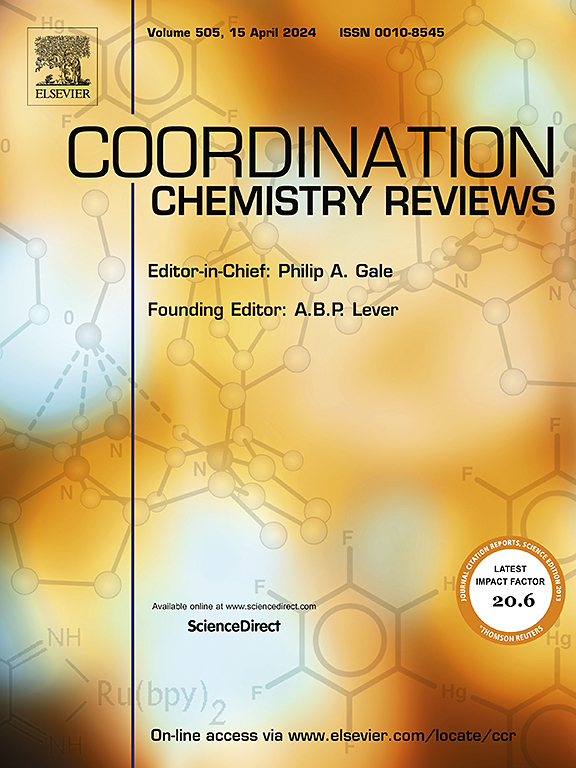Coordination chemistry-driven oxygen vacancy strategy for rational design of high-performance catalysts in BTX oxidation
IF 23.5
1区 化学
Q1 CHEMISTRY, INORGANIC & NUCLEAR
引用次数: 0
Abstract
With the rapid development of modern industry, volatile organic compounds (VOCs) are used in all walks of life. The widespread dissemination of VOCs, especially benzene, toluene, and xylene (BTX), has emerged as a critical environmental issue, posing significant threats to both human health and ecological systems due to their ubiquitous distribution and persistent nature. As a result, there is an urgent need for effective treatment methods to mitigate their impact. This review focuses on catalytic oxidation, a leading technology for the treatment of low to medium concentrations of VOCs. The catalyst, as the pivotal component of this technology, has attracted substantial research attention. Among diverse strategies for enhancing catalytic performance, oxygen vacancies (OVs) engineering has emerged as a particularly promising approach. This study provides a systematic and comprehensive review, structured around five key aspects: (1) Characterization of BTX Compounds: A comprehensive analysis of their properties, sources, and environmental and health implications. (2) Catalytic Functionality of OVs: An in-depth investigation into the mechanistic role of OV engineering in promoting BTX catalytic oxidation. (3) Reaction Mechanisms: A detailed elucidation of the catalytic oxidation pathways mediated by OV-rich catalysts. (4) Data Mining: an analysis of the relationship between catalyst structural features, reaction conditions, and catalytic efficiency based on the Random Forest algorithm in machine learning (5) Coordination Engineering of OVs Catalysts: A theoretical framework for optimizing OV configurations through coordination chemistry principles. (6) Sustainability Assessment: A comprehensive evaluation of catalyst systems using integrated techno-economic analysis and life cycle assessment methodologies, identifying pathways for economic and environmental optimization. Furthermore, this work also provides a forward-looking perspective on the future of catalyst development. Through identifying critical research gaps and emerging opportunities, it aims to contribute to the advancement of next-generation VOC treatment technologies, ultimately facilitating the development of more efficient and sustainable environmental remediation solutions.


配位化学驱动的氧空位策略对BTX氧化高性能催化剂的合理设计
随着现代工业的飞速发展,挥发性有机化合物(VOCs)被广泛应用于各行各业。挥发性有机化合物,特别是苯、甲苯和二甲苯(BTX)的广泛传播已成为一个严重的环境问题,由于其无处不在的分布和持久性,对人类健康和生态系统构成重大威胁。因此,迫切需要有效的治疗方法来减轻其影响。目前,催化氧化技术是处理中低浓度挥发性有机化合物的主要技术之一。催化剂作为该技术的关键组成部分,引起了大量的研究关注。在各种提高催化性能的策略中,氧空位(OVs)工程已成为一种特别有前途的方法。本研究围绕五个关键方面进行了系统和全面的综述:(1)BTX化合物的表征:对其性质、来源以及环境和健康影响进行了全面分析。(2) OV的催化功能:深入探讨OV工程促进BTX催化氧化的机理。(3)反应机理:详细阐述了富ov催化剂介导的催化氧化途径。(4)数据挖掘:基于机器学习中的随机森林算法分析催化剂结构特征、反应条件和催化效率之间的关系。(5)催化剂配位工程:利用配位化学原理优化OV构型的理论框架。(6)可持续性评估:使用综合技术经济分析和生命周期评估方法对催化剂系统进行综合评估,确定经济和环境优化的途径。此外,本工作还为催化剂的未来发展提供了前瞻性的视角。通过发现关键的研究差距和新出现的机会,它旨在促进下一代挥发性有机化合物处理技术的发展,最终促进更有效和可持续的环境修复解决方案的发展。
本文章由计算机程序翻译,如有差异,请以英文原文为准。
求助全文
约1分钟内获得全文
求助全文
来源期刊

Coordination Chemistry Reviews
化学-无机化学与核化学
CiteScore
34.30
自引率
5.30%
发文量
457
审稿时长
54 days
期刊介绍:
Coordination Chemistry Reviews offers rapid publication of review articles on current and significant topics in coordination chemistry, encompassing organometallic, supramolecular, theoretical, and bioinorganic chemistry. It also covers catalysis, materials chemistry, and metal-organic frameworks from a coordination chemistry perspective. Reviews summarize recent developments or discuss specific techniques, welcoming contributions from both established and emerging researchers.
The journal releases special issues on timely subjects, including those featuring contributions from specific regions or conferences. Occasional full-length book articles are also featured. Additionally, special volumes cover annual reviews of main group chemistry, transition metal group chemistry, and organometallic chemistry. These comprehensive reviews are vital resources for those engaged in coordination chemistry, further establishing Coordination Chemistry Reviews as a hub for insightful surveys in inorganic and physical inorganic chemistry.
 求助内容:
求助内容: 应助结果提醒方式:
应助结果提醒方式:


